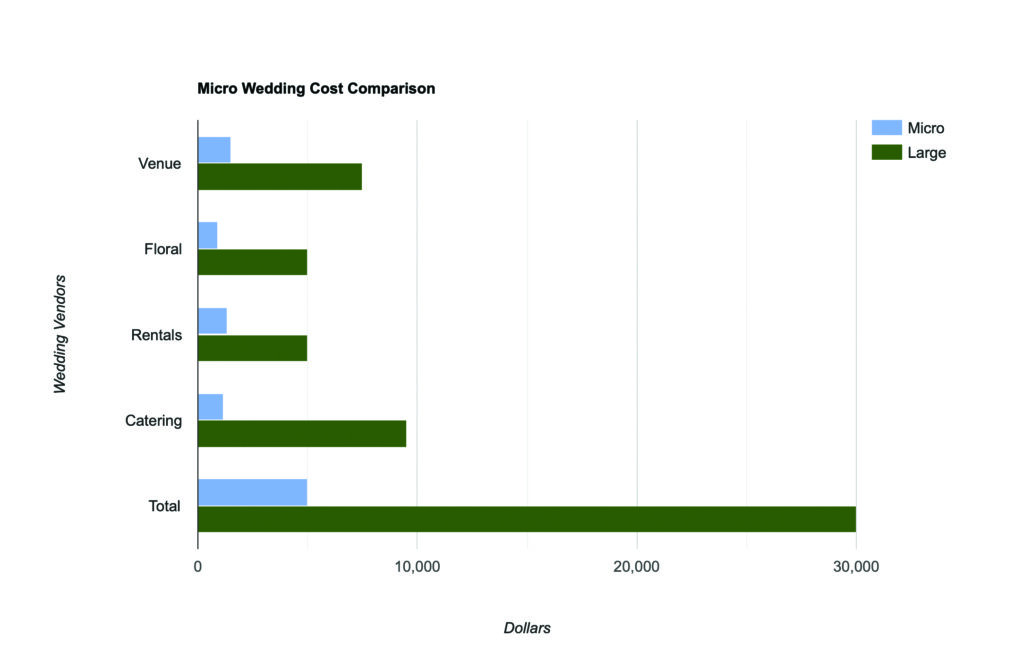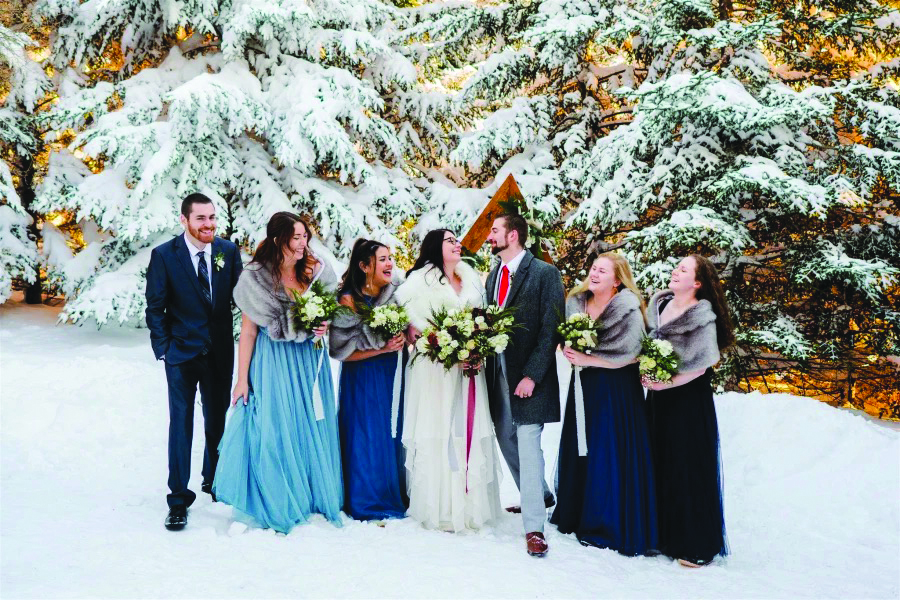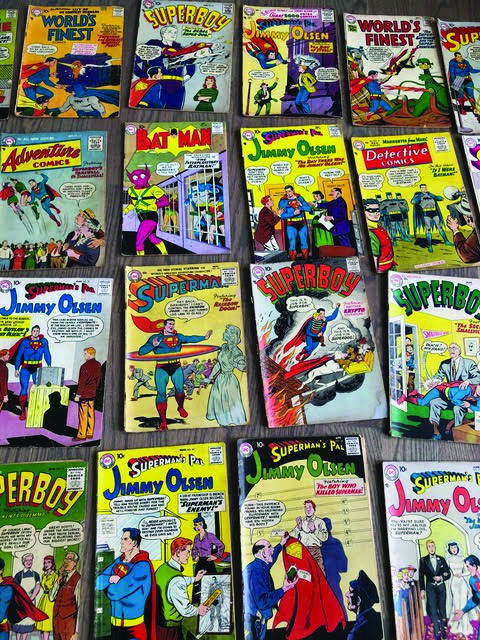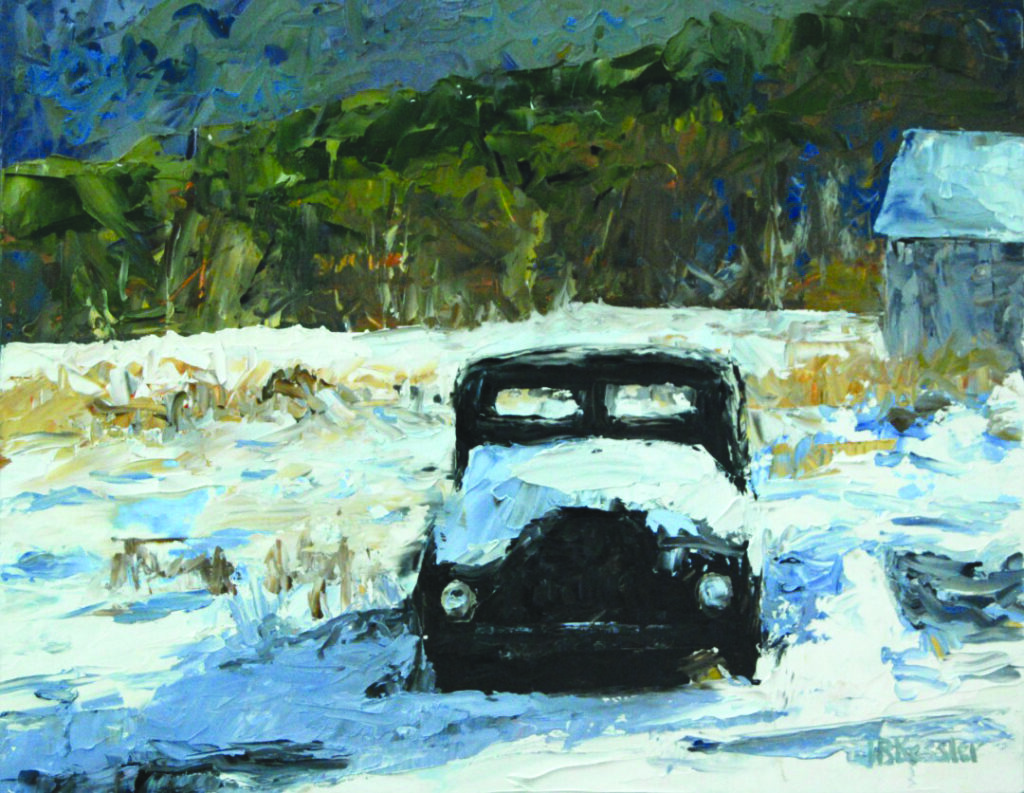Elopements and micro weddings are the next big, er, small thing
Dreams of elaborate weddings with hundreds of guests were dashed for many brides and grooms in 2020. As the pandemic took hold, social distancing restrictions made large gatherings impossible. And while some couples postponed their vows altogether, others reined in their plans and slashed their guest lists, opting for either an elopement, with no guests, or what has become known as a micro wedding, which usually includes about 15 people or fewer.
“Micro weddings definitely became a lot more popular [during the pandemic],” said Lauren Ingle, a wedding planner based in Manchester who ended up planning more than three dozen elopements and micro weddings last year and has 12 booked so far in 2021. “It’s definitely … the new norm at this point.”
“When Covid hit, a lot of people realized they didn’t want to postpone their wedding,” said Tatiana Cicuto, a justice of the peace and co-owner of Top of the Ridge Farm in New Durham, which just opened last spring and has since hosted several micro weddings and elopements. “Some decided, let’s get married now and have a [bigger] celebration later.”
For every wedding that was downsized that Ingle and Cicuto were part of, the end result was overwhelmingly positive.
“In my experience so far, [all of the couples] have been very happy to have something small and private,” Cicuto said.
“All of my micro weddings have been just as special and beautiful,” Ingle said. “Honestly, they seem even more intimate and beautiful.”
Elopement vs. micro wedding
“I think a lot of people have different ideas of what a micro wedding is,” Cicuto said.
To her, an elopement is two people and an officiant, and a micro wedding is, well, small.
“What that small means, the number, is really subject to interpretation,” she said.
She thinks of micro weddings as 10 or 15 people, though some venues in New Hampshire that offer micro weddings will include up to 25 people.
Ingle, who offers packages that range from elopement to extravagant, agrees that an elopement is typically just the couple and the officiant.
“It’s usually just exchanging of the vows and then the couple goes out for dinner, or goes up to a cabin up north [for the night],” Ingle said.
She said elopements can include elements like bouquets, a photographer, an arbor and Champagne so it “feels like something more than just going to town hall.”
Micro weddings, on the other hand, include almost all of the elements of a larger wedding but on a smaller scale — think sweetheart cake rather than a four-tier cake, appetizers rather than a four-course meal, and an amp that plays preloaded music rather than a live band.
Micro details
There are no hard and fast rules when it comes to micro wedding details, though — if the couple still wants a live band or a four-course meal for their small group, that can be arranged.
Cicuto likes to work closely with couples so their micro weddings are exactly what they want them to be.
“This couple who got engaged, they decided to get married three weeks later,” she said. “They came to us and said, ‘We know it’s crazy, but can we get married [in three weeks]?’ … They wanted it outside on a Tuesday in July. … We said, ‘Yes, of course we can get it done!’”
Cicuto said the couple was very flexible and understood that in three weeks they couldn’t get, say, blue tulips in the middle of July. She worked with them to plan their music and their flowers and set up vignettes around the property, like an antique tub filled with ice and drinks. The couple brought in their own caterer and photographer.
“It was a very collaborative approach,” Cicuto said. “There were some things they chose not to have … but otherwise it was a normal wedding. It wasn’t missing anything critical.”
Likewise, Ingle created exactly the wedding that Rachel and Steele Hudson wanted (that’s according to the bride herself — see her wedding story on p. 22), even though they had to downsize from a 100+-person wedding in Jackson to a micro wedding with 12 people.
“She ended up not getting many deposits back from some vendors, so it had to be pretty small and affordable,” Ingle said.
Ingle was able to take the elements of the Hudsons’ original wedding and scale it down.
“It was the most magical day,” Ingle said.
Less stress, less money
One of the benefits of a micro wedding (or an elopement, for that matter) is that it’s usually a lot easier to plan than a large wedding — for the couple who wanted to get married in three weeks, anything bigger than a micro wedding would have been next to impossible for Cicuto to plan in that amount of time.
Cicuto herself enjoyed a stress-free micro wedding last month, marrying Gino in December at their B&B with just an officiant and their two kids, who were holding up phones so friends and family around the world could watch.
“We had been together for such a long time, and my now husband said, ‘You know, 2020 has been such a crap year, let’s end it on a good note,’” Cicuto said.
They made sure the kids could come that Sunday and made a cake the day before.
Rachel Hudson wanted even less involvement in the planning of their micro wedding.
“She was sick of planning,” Ingle said. “She didn’t want to deal with the stress of re-planning a whole wedding.”
So Ingle and Hudson’s maid of honor took over and left her out of everything — including where the wedding was going to take place.
“She was actually blindfolded on her way up to the venue,” Ingle said. “She didn’t have to lift a finger.”
Aside from less planning, the day itself is less stressful too.
“It was seven minutes and done,” Cicuto said of her nuptials.
Hers may be an extreme example, but both Ingle and Cicuto have found that micro weddings have fewer high-blood-pressure moments.
“[The couple] can sit back and relax and enjoy their friends and family, as opposed to having to say hi to 150 people,” Ingle said. “[That] can be overwhelming. … With a smaller wedding, it’s just so laid back and relaxed.”
Perhaps one of the biggest benefits of eloping or having a micro wedding is how much less expensive it is, mainly because you’re not providing food and entertainment for a huge group of guests, but also because the fancy, costly details are less important when you’re not trying to impress that huge group.
“A lot of couples have come to terms with the fact that some things are not needed,” Cicuto said.
Ingle said a lot of the couples she worked with were relieved once they transitioned to an elopement or a micro wedding.
“I’m saving so much money now, and I’m not having to invite all these people and plus ones that I’ve never met,” Ingle said. “Moving forward, I think these smaller weddings are going to be more popular.”
Wedding Packages

Large wedding
Average total cost: $30,000+
People: 50+
Usually includes:
-Venue
-Rentals
-Floral
-Band/DJ
-Photo & video
-Hair and makeup
-Wedding planner
-Officiant
-Transportation
-Lodging
-Catering
-Food & beverages
-Cake
-Attire
-Stationary
Micro wedding
Cost: $5,000-$12,000
People: Usually 15 to 25
Usually includes:
-Venue
-Rentals
-Food & beverages
-Floral
-Hair and makeup
-Music
-Photo
-Wedding planner
-Stationary
-Lodging
-Transportation
-Attire
Elopement package
Cost: $500-$1200
People: The couple only with officiant, no guests
Usually includes:
-Location
-Arbor
-Bridal bouquet(s) /
Boutonnière
-Dinner for two at a local restaurant
-Local lodging accommodations for the couple
-Champagne for 2
A 2020 wedding story

Rachel Hudson (formerly Prescott) shares her experience of being a bride in 2020. She and her husband, Steele, got married Dec. 18.
I had always wanted a winter elopement, just the two of us, and then … a big party with friends and family after the fact. He wanted a summertime wedding with as many people … as possible. We ended up compromising and decided on a big winter wedding [at the] Mountain View Grand Resort in Whitefield. … Then Covid hit.
Over the months more and more guests dropped out. … It got to the point where I started to dread the wedding. I had nightmares about an empty ballroom and an even more empty dance floor. … When we got down to about 25 guests — including the wedding party — we decided to cancel. The venue couldn’t lower the minimum guest count any further, [and] too many of our closest friends and family couldn’t be there. We were desperately holding on to the few shreds of the big fun wedding we wanted, and we knew no matter what happened we wouldn’t be able to save it. … We canceled it nine days before the wedding.
[A day later] my maid of honor contacted Lauren and frantically put together a plan to save the wedding, without my knowledge. Lauren … found a venue that was willing to take us in on such short notice and made sure it was somewhere that was similar to what I had originally wanted. She worked … with my maid of honor and my photographer/videographer, Grace from Novae Film & Photo, to create a surprise wedding from scratch in a week.
[Meanwhile], I was researching a sad courthouse wedding. I was eventually told that there was a rescue effort and that I should still plan on a wedding. My husband and I agreed to it on one condition: We wanted to be completely kept out of the loop. We had already spent so much time, effort [and] money … [on] our original wedding that we literally couldn’t bear to make another one. …
I was blindfolded and brought to the location. My maid of honor dropped off some decorations and Lauren took off decorating while I was blindly escorted to a room to get ready. … I had never seen the spot; we never had a rehearsal. The first time seeing the area, the aisle, everything, was during the actual wedding. It was surreal.
It was perfect, every detail. Everything was heartburstingly perfect. Lauren found the best ceremony spot I could ever hope for [I later found out it was Lakeview Inn in Wolfeboro] and decorated it exactly how I would have wanted. It was tucked into a wooded circle, surrounded by fresh snow-covered pine trees. … The arch was simple and rustic, decorated with evergreens, antlers and juniper berries. There were lanterns with real candles lining the aisle that wound through the woods. There were only 11 of us total, which ended up being better than expected — just our closest friends and family. The reception was inside the Inn, and it was decorated like a big family dinner on Christmas, with a large single-family table and intimate lighting. We all enjoyed ourselves immensely. The Inn is family-run and they cooked for us and served us, their dogs and cats coming in and out for some pets and scratches. It felt so warm and cozy, fireplace going, wine pouring and conversation that you could actually hear and participate in.
It was better than anything I could have hoped or planned myself. Instead of compromising and making cuts and downgrading a big wedding repeatedly, they created a new micro wedding that wasn’t desperately trying to be something it wasn’t. … Being able to sit back and not plan or worry about the wedding took so much of a weight off my shoulders. … My husband and I will have a big party in a year or two so we can throw on the fancy clothes again, have a dance party like we wanted and invite everyone who missed out, but there is honestly nothing I regret about my mini wedding.
My dream wedding was a small winter wedding elopement; I was lucky enough to get that. My husband’s dream was a big summer wedding party, and now we get to plan that too. We both get to have the elements of our weddings that we wanted without having to sacrifice anything.
Featured Photo: A previous Winter Fest in downtown Concord. Photo by Steven Lipofsky.






